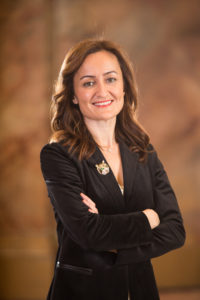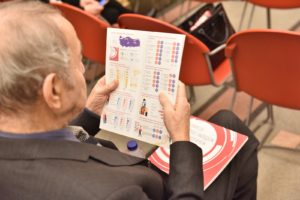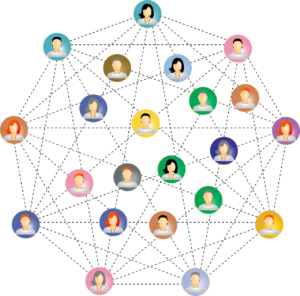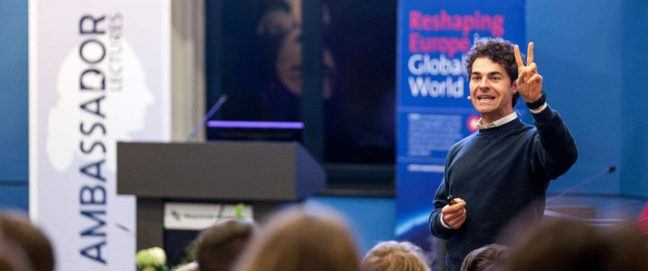 At the end of this year’s PEXforum in Madrid, it was announced that next year’s event will be held in Turkey. So it was an opportune moment for Charles Keidan to talk to Rana Kotan of TUSEV about the work of the Turkish philanthropy support organisation and the state of philanthropy in the country.
At the end of this year’s PEXforum in Madrid, it was announced that next year’s event will be held in Turkey. So it was an opportune moment for Charles Keidan to talk to Rana Kotan of TUSEV about the work of the Turkish philanthropy support organisation and the state of philanthropy in the country.
You used to work for the Sabanci Foundation but have now moved to TUSEV. What prompted you to move from grantmaking in a family foundation to being responsible for all of Turkey’s foundations?
I’m an ex-investment banker who moved to the non-profit sector to make more of a social contribution. My work at the Sabanci Foundation gave me a really good grantmaker’s perspective on the sector. This new role at TUSEV will give me a broader perspective of civil society and allow me to contribute to the development of the infrastructure, the financial, legal as well as operational infrastructure.
So TUSEV represents foundations in Turkey but also civil society?
Foundations constitute the majority of our members but we also have some larger NGOs. Basically almost all the big players in the sector are members.
Would you say there’s not so much distinction between philanthropy and foundations on the one hand and civil society on the other? It’s all civil society organisations.
Yes because we take a broad view of philanthropy. It covers not only foundations but also the traditional associations, NGOs and even corporations and their social responsibility activities. We don’t limit the term to foundations or to grantmaking.
I believe that TUSEV has played an important role in increasing both the volume and quality of giving and going forward it will continue to make campaigns and inspire people to give even more
What are your main hopes as you take on this role at TUSEV?
For TUSEV a new period is starting. Our board has adopted a new approach called policy governing principles, initially developed by John Carver, but adapted to our situation. We now have four focus areas and, in those areas, we are expected to deliver solid, measurable results. The areas are: legislative issues and advocacy, increasing individual giving, improving the image of civil society, and providing information data and research to nurture philanthropy. In those four areas, we will restructure our activities in order to achieve more measurable and solid results. That will change how we work. We’re experimenting right now but if we can really achieve those results, we will provide a model for Turkish civil society organisations to adopt if they want to.
However, TUSEV’s main role has always been to provide knowledge, legal assistance, tax-related assistance to the different actors in Turkish civil society. They call us whenever they have a technical problem – related to taxation or foundation law or, for example, if they want to start something and they’re not sure which would be the right legal structure for their philanthropic purpose. So TUSEV’s most important role has always been as the body with the experience, the knowledge and the technical capability and that will continue to be a big role going forward.

‘TUSEV has been working on infrastructure development for almost ten years now and we are seeing that people are more motivated to give.’
How many members do you have and what are their biggest needs?
We have 80 members, but anybody can call us even if they’re not members. What are their needs? As I mentioned legal advice is an important role and it will continue to be but TUSEV has also adopted a new role of inspiring and mobilising different groups of people to give. TUSEV has been working on infrastructure development for almost ten years now and we are seeing that people are more motivated to give and to make donations, so we have introduced some new approaches, some of them adapted from other countries, like giving circles for example. TUSEV itself has started five giving circles and there are also some others to which we have been providing technical assistance. This new way of giving creates a community feeling and motivates people to give, especially to NGOs, which is something that we want to develop further.
Why is that?
When you look at giving in Turkey, it’s still largely charitable. We have recently published a report on philanthropy in Turkey which highlights a number of challenges. Social capital in Turkey is still weak because people don’t trust each other. As a consequence, they want to give directly to people they know, to friends, family and close relatives. They also give a lot for religious purposes. That’s the traditional way of direct giving and helping people in need dominates. But the same research also shows that people giving to NGOs, to make a change on a specific issue is also increasing.
What are the most popular issues?
Based on this research, the three issues where people think it’s more effective to give to NGOs rather than directly are disability, the environment and education. So, we see an increase in giving to NGOs which is a good sign. At the same time institutions like TUSEV, as they bring new approaches and introduce new ways of giving, create another dynamic, because there is a good number of people who could be potentially willing to give if they find the right way.
So, a lot of people aren’t giving because they haven’t found the way that suits them?
Sometimes they are only aware of traditional ways of giving or some of them are already giving but could be giving more. So we will be exploring all these different groups of people and I believe that there is untapped potential including among corporations, too.
Who are the families or individuals in Turkey that are leading the way and are setting up foundations or vehicles to give?
Most of them are already supporting us. They are members and beyond members, they give capital, they give intellectual capital, they give their time, so they really are committed to improving and supporting the infrastructure and developing civil society.
Could you give me an example of a foundation that you’ve worked with who is doing some interesting things?
I don’t want to single anyone out, but all the big families have founded their own foundations, almost all of them are engaged in philanthropy in one way or another. Some of them are more inclined to combine their philanthropic effort with their business and they plan their giving to respond to the needs of their customers. Some of them have other programmes which are not related to their business but which really support NGOs working on social issues. The motivation differs.
At TUSEV, we don’t really want to concentrate on the shrinking space because it’s an issue everywhere, not only in Turkey. Instead, we want to focus on a more optimistic point of view, because achievements don’t come from despair or negativity.
Do some of them run their own programmes, as well as giving to others?
Yes, most of these families, as well as foundations, also have schools and some of them have their universities, so they want to contribute to philanthropy as well as to education and to other parts of society. We regard them all as very valuable initiatives and that all forms of giving should increase. I believe that TUSEV has played an important role in increasing both the volume and quality of giving and going forward it will continue to make campaigns and inspire people to give even more and we will collaborate with other groups to make this possible.
 How does the Turkish government influence the country’s philanthropy? Does it affect how and to what donors give?
How does the Turkish government influence the country’s philanthropy? Does it affect how and to what donors give?
The government doesn’t get involved with the philanthropic choices of families or private foundations. The most important challenge is that right now, there’s a lot of political tension in the region which affects the economy and we have seen from the research I mentioned earlier that, whenever economic stability declines, people cut back on their giving, not only giving to NGOs but all kinds of giving.
There are concerns about crackdowns on judicial freedom and the rule of law in Turkey. Is there a view that foundations and indeed TUSEV should be promoting democracy and democratic institutions?
TUSEV has the important role of being a bridge between the public and civil society, between business and civil society, between civil society members themselves, and therefore it needs to maintain a neutral, non-political position, but at the same time, it has also contributed to the protection of the civic space, so it’s a difficult balance to maintain.
We are all different, we have different dynamics, different contexts, but we are dealing with similar challenges, so we need to find more creative ways to collaborate.
There’s a view that philanthropy isn’t doing enough to support social movements because it finds it hard to engage with them. Do you see a role for philanthropy in supporting the social movements that are challenging the status quo in Turkey? Or is that something philanthropy would steer clear of?
At times like this, it’s more difficult for philanthropy to support these kinds of things.
Why is it difficult?
Because of the context. At TUSEV, we don’t really want to concentrate on the shrinking space because it’s an issue everywhere, not only in Turkey. Instead, we want to focus on a more optimistic point of view, because achievements don’t come from despair or negativity. Our role is to motivate and to bring out the achievements so that people don’t give up and continue their work. At the same time, you need to shape our work based on external constraints.
One issue that Turkey has been dealing with is that of refugees. What role have foundations and philanthropy been playing in what must be a big challenge for the country?
There has been a lot of philanthropic capital spent on this issue, especially on integration, but it mainly comes from foreign sources like the EU and other European foundations. Turkish foundations also have some programmes, but their activities depend on priorities of the families who fund them. It’s a big issue to integrate Syrian children into Turkish education for example, but there are lots of initiatives underway.
And civil society is playing an important role?
Yes.
 We’re surrounded at this Forum by philanthropy networks and organisations from across Europe who are dealing with shared challenges. What have your impressions been? Has it been inspiring and if so, how?
We’re surrounded at this Forum by philanthropy networks and organisations from across Europe who are dealing with shared challenges. What have your impressions been? Has it been inspiring and if so, how?
Definitely. We were talking about new ways of collaboration. We are all different, we have different dynamics, different contexts, but we are dealing with similar challenges, so we need to find more creative ways to collaborate. We need to emphasise our commonalities rather than differences. I think that was a common issue that we talked about. We’re not there yet but it’s good to brainstorm about it. For example, we want to introduce payroll giving. We think the amount doesn’t matter, as long as it’s continuous because NGOs need a continuous income. We will start this in our team because we want to experiment with how the process works and then we will make a model to be adapted by other companies and other institutions. We heard today that several networks have already introduced that so we started sharing knowledge, and we will learn from their experience and have a field visit to a country where it’s already being applied. So even on the first day, we had a solid collaboration opportunity and I’m sure as we get deeper into the conversation, we will find other opportunities.
There are delegations from different countries across Europe. Which ones do you think you can learn most from?
Rather than a country, an initiative inspires me. For example, we’re preparing to launch the Giving Tuesday campaign in Turkey and I think it will be huge. The timing is right after the Black Friday when people spend so much money on stuff they don’t need, and there’s a reaction, a desire for collective giving and this spirit really motivates me. I see it as an inspirational campaign and I believe if we can adapt it to the Turkish context people also will get a lot of inspiration. We will bring in many NGOs, companies, even municipalities so it will be a huge celebration of giving of all kinds, not only money but we also want to motivate people to give their expertise. It’s starting this year. We’re getting prepared and we’re very excited.
Do you see any other country with a similar context to Turkey and is similar in terms of the development of philanthropy?
Maybe the Balkans. I can’t say a specific country. At PEXforum2o20 we were talking about data visualisation and about how in some countries donors concentrate more on certain issues, initiatives and NGOs so you can see bigger data and bigger impact, but in other countries, it’s more scattered. We’re at that stage at the moment and think it was Croatia or another Balkan country where I saw some similarities. Donors are giving grants, they are supporting different issues based on their own priorities, but it will take some time for them to grow those initiatives, maybe into movements, maybe into solutions. I think as time passes, these will develop into a more concentrated effort.
As part of the profiles that were put together, every country network identified an animal that they were associated with. Can you remind me of what yours is and why?
It was an elephant, the same as the EFC! It’s big and it has this great image and presence, but at the same time it’s a bit slow and it’s cautious and it watches its steps carefully.
Charles Keidan is editor of Alliance magazine



Comments (0)